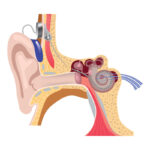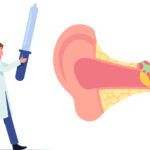Is Tinnitus But No Hearing Loss the Same As Objective Tinnitus? A Comprehensive Guide
Tinnitus, a commonly reported hearing disorder, affects millions of people worldwide. While some people experience tinnitus alongside hearing loss, others may experience tinnitus without any perceivable hearing loss. This blog post will explore whether tinnitus with no hearing loss is the same as objective tinnitus, and what differentiates these two phenomena. We will cover the causes, symptoms, diagnosis, and treatment options for both types of tinnitus, as well as discuss some of the latest research in the field.
What is Tinnitus?

- Definition
Tinnitus is a common medical condition that causes a person to hear a persistent sound or noise in their ears without any external source. The sound can be a ringing, buzzing, hissing, or whistling noise and can vary in intensity and frequency.
Tinnitus can be caused by a range of factors, including exposure to loud noises, ear infections, certain medications, and even stress. The condition can be temporary or chronic and can have a significant impact on a person's quality of life, causing sleep disturbances, anxiety, and difficulty concentrating.
Treatment options for tinnitus include cognitive-behavioral therapy, sound therapy, and medications, and the best approach will depend on the underlying cause and severity of the condition. While there is no cure for tinnitus, many people are able to manage their symptoms and improve their quality of life with the right treatment and support.
2. Subjective vs. Objective Tinnitus
There are two primary types of tinnitus: subjective and objective. Subjective tinnitus is the most common form and is only audible to the person experiencing it. Objective tinnitus, on the other hand, is a rare form of tinnitus that can be heard by both the person experiencing it and an external observer, such as a healthcare professional.
3. Causes
Tinnitus can be caused by a variety of factors, including exposure to loud noises, ear infections, head injuries, and certain medications. In some cases, tinnitus can be an early sign of hearing loss, even if it has not yet become apparent to the individual.
4. Prevalence
Approximately 10-15% of adults experience some form of tinnitus, with a higher prevalence among older individuals and those with a history of noise exposure.
Tinnitus Without Hearing Loss
1. Characteristics
Tinnitus without hearing loss is a condition in which an individual experiences tinnitus symptoms but does not have any measurable hearing loss. This type of tinnitus may be temporary or persistent and can vary in severity.
2. Causes
The causes of tinnitus without hearing loss can include exposure to loud noises, stress, anxiety, or underlying medical conditions, such as Meniere's disease or otosclerosis. In some cases, the exact cause of tinnitus without hearing loss may be unknown.
3. Diagnosis
Diagnosis of tinnitus without hearing loss typically involves a comprehensive hearing evaluation by an audiologist or otolaryngologist. This evaluation will include a thorough medical history, a physical examination of the ears, and hearing tests to assess the individual's hearing sensitivity and determine if any hearing loss is present.
4. Treatment
Treatment options for tinnitus without hearing loss may include sound therapy, cognitive-behavioral therapy, relaxation techniques, and medications to manage stress and anxiety. In some cases, treating the underlying medical condition can help alleviate tinnitus symptoms.
Objective Tinnitus

1. Characteristics
Objective tinnitus is a rare form of tinnitus that can be heard by both the person experiencing it and an external observer. This type of tinnitus is typically caused by an identifiable source, such as blood flow or muscle contractions within the ear or surrounding structures.
2. Causes
Objective tinnitus can be caused by a variety of factors, including:
- Vascular abnormalities, such as an arterial aneurysm or arteriovenous malformation.
- Tumors, particularly those involving the ear or surrounding structures.
- Eustachian tube dysfunction, which can result in abnormal pressure changes within the middle ear.
- Musculoskeletal factors, such as temporomandibular joint (TMJ) dysfunction or spasms of the muscles within the ear.
- In rare cases, certain medications can cause objective tinnitus.
3. Diagnosis
Diagnosis of objective tinnitus involves a comprehensive examination by an audiologist or otolaryngologist. This examination will include a thorough medical history, a physical examination of the ears, and various tests to identify the underlying cause of the tinnitus. These tests may include imaging studies, such as an MRI or CT scan, and specialized tests to assess blood flow and muscle activity.
4. Treatment
Treatment options for objective tinnitus will depend on the underlying cause. In some cases, treating the underlying condition can eliminate or significantly reduce tinnitus symptoms. Treatment options may include medications, surgery, or other interventions, such as addressing TMJ dysfunction or managing blood pressure.
Comparing Tinnitus Without Hearing Loss and Objective Tinnitus
1. Similarities
Both types of tinnitus can have a significant impact on an individual's quality of life, causing stress, anxiety, and sleep disturbances.
Both tinnitus without hearing loss and objective tinnitus may benefit from a combination of therapies, such as sound therapy, relaxation techniques, and cognitive-behavioral therapy.
2. Differences
Objective tinnitus is a rare form of tinnitus that can be heard by both the person experiencing it and an external observer, whereas tinnitus without hearing loss is subjective and can only be heard by the individual experiencing it.
Objective tinnitus is typically caused by an identifiable source, such as blood flow or muscle contractions, while the causes of tinnitus without hearing loss can be more varied and sometimes unknown.
Latest Research and Developments
1. Tinnitus Research
Ongoing research in the field of tinnitus aims to better understand the underlying mechanisms, improve diagnostic methods, and develop more effective treatments. Recent studies have focused on the role of the brain in the perception of tinnitus and the potential for targeted therapies, such as neuromodulation or transcranial magnetic stimulation (TMS).
2. New Treatments and Therapies
In addition to the currently available treatments, researchers are exploring novel approaches to managing tinnitus, such as:
- Tailored sound therapy: using customized sound frequencies to match the individual's tinnitus pitch.
- Tinnitus retraining therapy (TRT): is a combination of sound therapy and counseling to help individuals habituate to their tinnitus.
- Pharmacological interventions: such as the development of new medications specifically targeting tinnitus symptoms or the underlying neurological processes.
- Vagus nerve stimulation: is a treatment that involves electrical stimulation of the vagus nerve to modulate brain activity and potentially reduce tinnitus symptoms.
- Regenerative medicine: including the use of stem cells or gene therapy to restore damaged auditory structures and potentially alleviate tinnitus.
Conclusion
In summary, tinnitus without hearing loss is not the same as objective tinnitus, although both conditions share some similarities in their impact on an individual's quality of life. Tinnitus without hearing loss is a subjective experience that cannot be heard by others, while objective tinnitus can be heard by both the person experiencing it and an external observer. The causes, diagnosis, and treatment options for these two types of tinnitus also differ, with objective tinnitus typically having an identifiable underlying cause.
As research in the field of tinnitus continues to advance, our understanding of the complex mechanisms underlying these conditions will improve, and new treatment options will become available. It is essential for individuals experiencing tinnitus, whether with or without hearing loss, to consult with a healthcare professional for accurate diagnosis and appropriate management of their symptoms.
Sources
https://pubmed.ncbi.nlm.nih.gov/23827090/
https://www.sciencedirect.com/science/article/abs/pii/S1474442213701601







